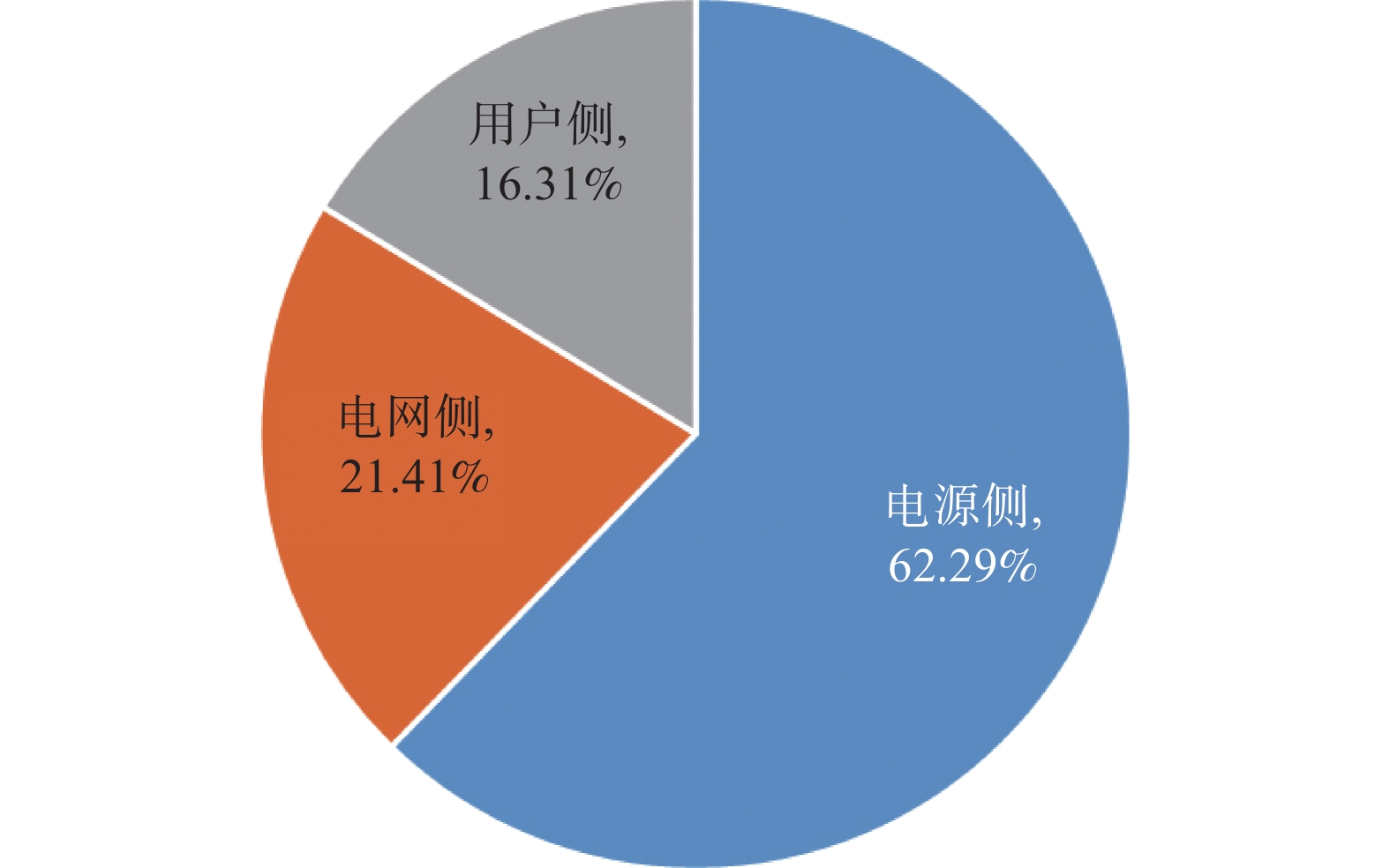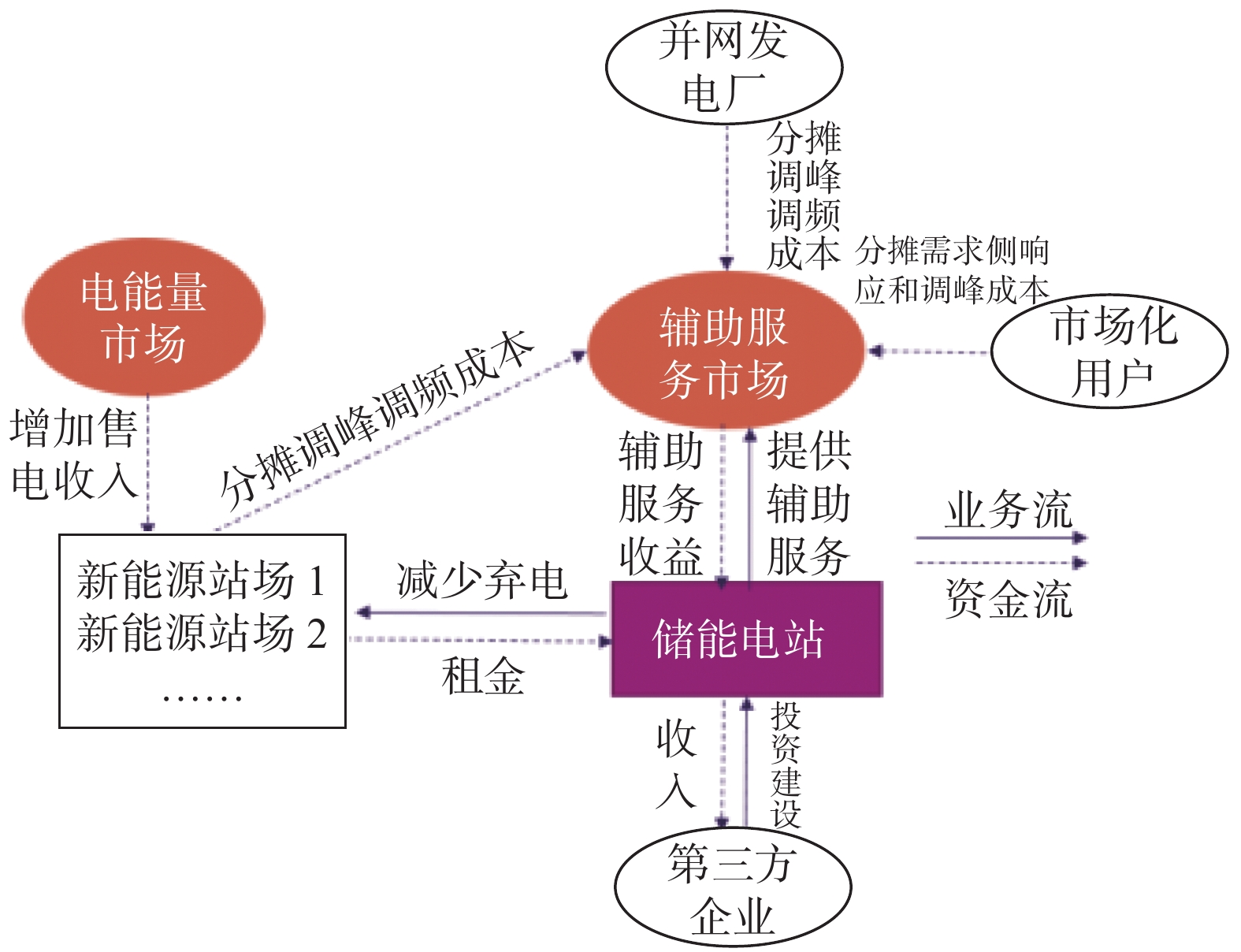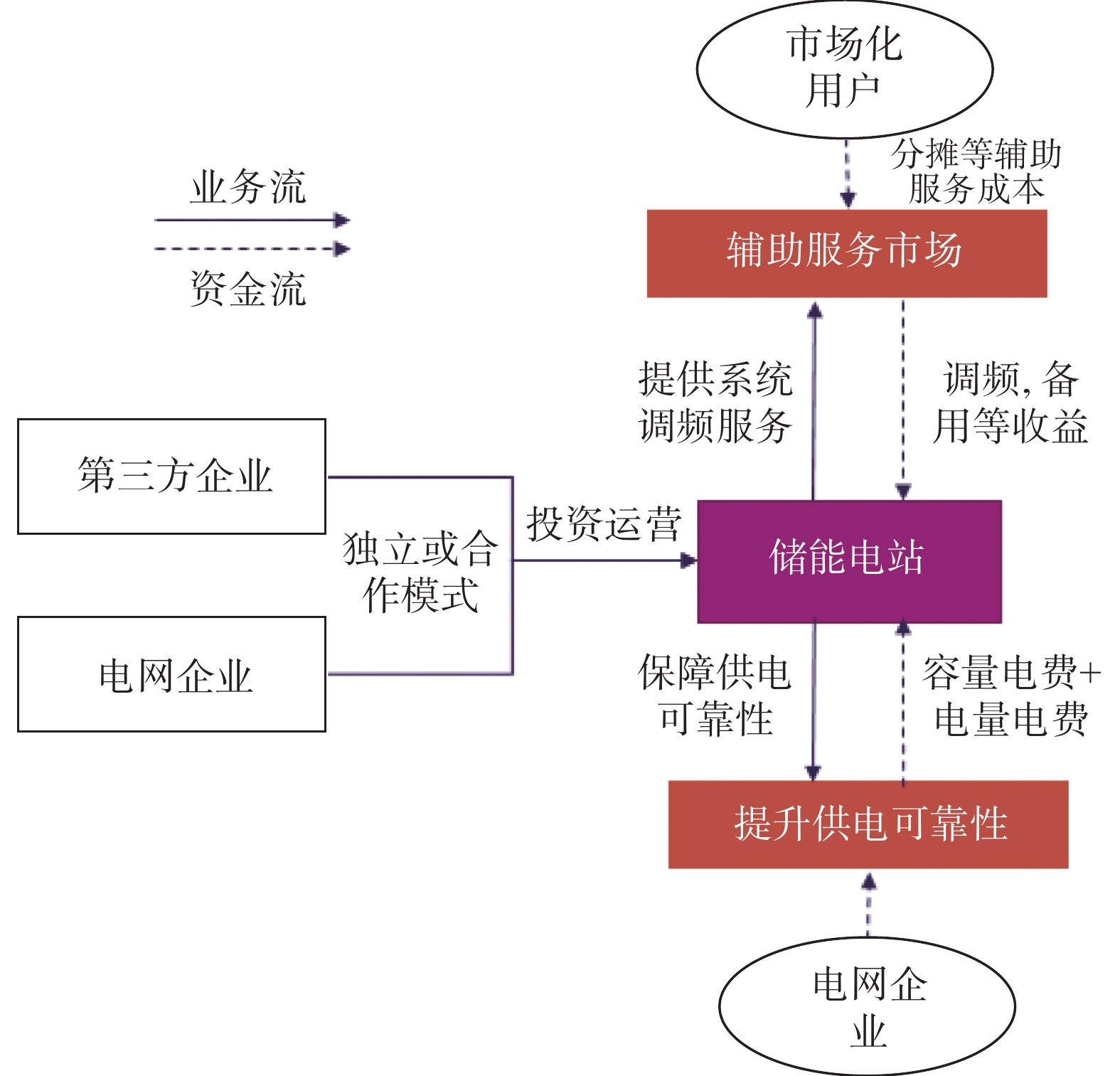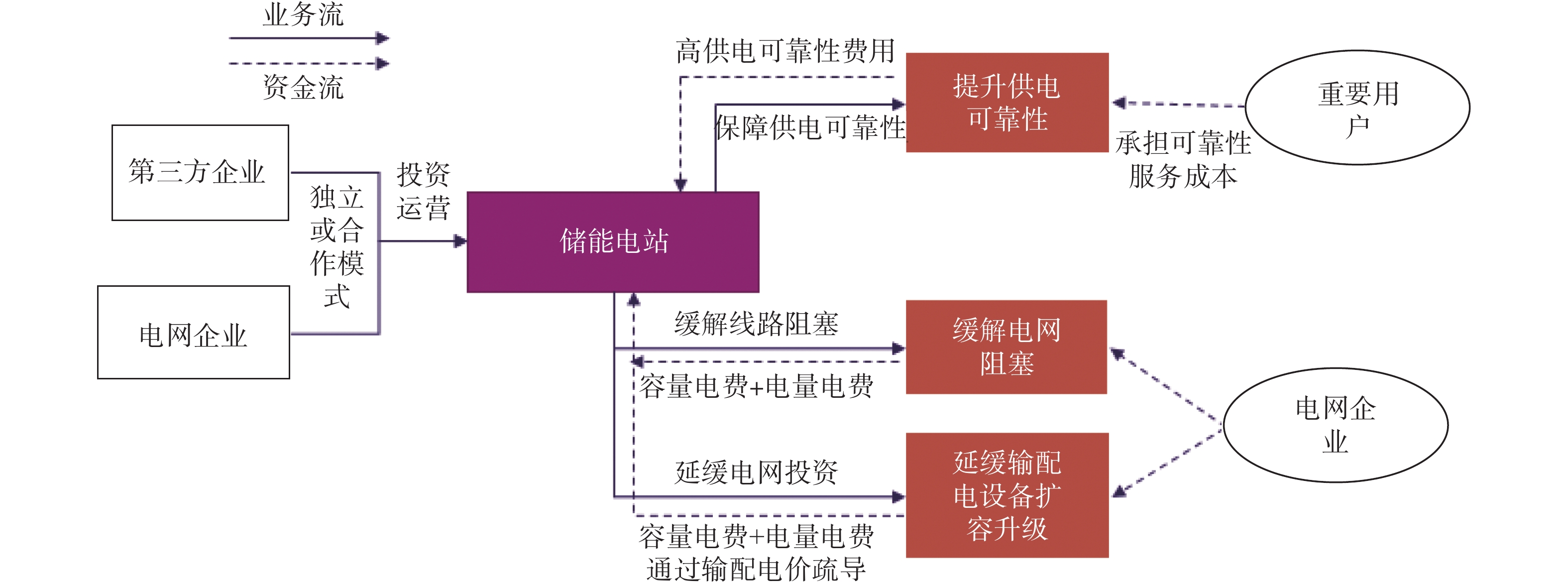-
摘要:目的 在“双碳”目标下,以新能源为主体的新型电力系统在“源网荷”侧均赋予了储能重要战略地位,在灵活电力市场机制下,挖掘储能商业模式及成本回收机制,完善储能相关市场规则和支撑政策机制,对促进储能可持续发展,推进新型电力系统的建设和双碳目标的实现有着重要意义。方法 基于国内外储能收益定价经验,采用经营期定价法、成本+合理收益、电力失负荷价值等多种方法对储能收益来源及成本回收机制进行了测算。结果 基于现有政策路径,全面梳理了“源网荷”侧新型储能应用场景、商业模式及成本回收机制,总结了现存问题及政策建议。结论 研究成果具备较好的可操作性和参考性,可为储能大规模发展和政策制定提供有益参考。Abstract:Introduction Under the goal of "carbon peak and neutrality" goal, the new power system with new energy as the main body has attached great importance to energy storage on the "source-grid-load" side. Exploring the energy storage business model and cost recovery mechanism, and improving the energy storage related market rules and supporting policy mechanism are of great significance to promote the sustainable development of energy storage, the construction of new power system and the realization of the "carbon peak and neutrality" goal.Method The source of energy storage income is calculated by using various methods such as operation period pricing method, cost + reasonable income and power load loss value based on energy storage pricing at home and abroad.Result The application scenarios, business models and cost recovery mechanism of new energy storage on the "source-grid-load" side were sorted out, and the existing problems and policy suggestions were summarized.Conclusion The research results are of good operability and reference value, and can provide useful reference for the development and policy-making of energy storage.
-
Keywords:
- new energy storage /
- business model /
- pricing mechanism /
- cost recovery /
- support policy
-
-
表 1 储能度电成本测算
Table 1 The calculation of electrochemical energy storage LCOE
费用明细 磷酸铁锂电储能 抽水蓄能电站 储能造价 1200
元/kWh2500
元/kWh5500
元/kW7000
元/kW循环次数或循环年限 5000次 5000次 40年 40年 造价成本/[元·(kWh)−1] 0.12 0.25 0.1 0.12 运维成本/(元·(kWh)−1) 0.024 0.03 0.06 0.07 税金及损耗成本/[元·(kWh)−1] 0.13 0.11 0.08 0.1 成本/[元·(kWh)−1] 0.27 0.39 0.24 0.29 表 2 新能源项目加装储能承受能力的测算表
Table 2 The affordability of new energy projects with energy storage
项目造价 盈利分析 造价下降测算 光伏造价 降至2.7元/W,安装10%容量的储能,光伏项目可满足7%的收益率 现规划项目造价约为4元/W,需下降33% 风电项目造价 降至6.5元/W,安装10%容量的储能,风电项目可满足7%的收益率 现规划项目造价约为7元/W,需下降7% 注:以上造价数据为2021年底数据。 表 3 发电侧储能主要应用场景及其商业模式
Table 3 Main application scenarios and business models of energy storage on the power generation side
收益模式 市场化机制 非市场化机制 费用承担方 减少弃电收益 在用电低谷期,利用储能集蓄新能源弃电,在用电高峰期再放电上网,解决新能源弃电问题 建立发电侧调峰市场,采用新能源与储能双边协商或集中竞价的价格确定充放电
价格基于项目经营期法,按既定的收益率反算年度收入,由新能源站场按容量支付租金 新能源 深度调峰 电力系统存在调峰需求,发电侧储能申报独立容量参与系统调峰服务 按地区调峰市场机制
执行设定区域调峰补偿价格,按充电电量补偿 并网发电厂及市场化
用户调频 发电侧侧储能申报独立容量参与调频服务 按地区调频市场机制
执行无市场化机制区域按两个细则执行 并网发电厂 需求侧响应 发电侧储能申报独立容量参与需求侧响应 按地区需求侧响应机制执行 无市场化机制区域按固定电价补偿 市场化用户 表 4 电网侧储能主要应用场景及其商业模式
Table 4 Main application scenarios and business models of grid side energy storage
应用场景 主要用途 成本回收机制 关键节点
布局储能电力调峰,系统调频,
备用容量,缓解电网阻塞市场化收益由市场主体共摊;
非市场收益由电网公司支付,
再从输配电价回收电网末端及
偏远地区系统调频,备用容量,
提升供电可靠性重要负荷
用户需求缓解电网阻塞、延缓
输配电设备扩容升级,
提升供电可靠性表 5 电网替代性储能定价方法及资金来源机制设定建议
Table 5 Suggestions on pricing method and fund source mechanism of alternative energy storage in power grid
储能价格机制 定价方法 备注 成本回收机制 容量价格 按经营期法,设定固定的收益率,涵盖储能的建设成本,运维成本,财务及税金成本等,测算容量
电价鼓励储能参与市场化服务获取收益,在下一个监管周期计算容量电费时,考虑扣除一定比例市场化收益 市场化及输配电价回收 电量电价 按照储能充放电损耗,测算电量电价,一般取15%~20%的充放电价差 电量电价按储能的实际综合效率确定 计入电网
线损回收表 6 储能备用服务定价方法设定建议
Table 6 Suggestions on setting pricing method of energy storage standby service
储能价格
机制定价方法 备注 容量成本 C1=I/(T·C)
式中:C1为储能单位容量成本,I为储能系统投资,T为备用储能期望利用小时数,
C为储能额定容量。指储能提供备用容量所发生的折旧费、维护费等固定费用。 电能成本 C 2=Pc
式中:Pc为储能充电价格。 储能的电能成本约等于充电费用,这部分成本可以通过电量价格来反映,在备用容量被真正调用时按发电效益进行补偿。 机会成本 在给定的时段t内,备用储能容量参与有功市场的运行:
C3=Pr·t·(Pe–Ce)
式中:C3为储能备用机会成本;Pe为储能单位售电收益;Ce为储能充放单位电量成本。指储能因提供备用而减少的发电量收益。假设储能将部分容量Pr用作备用,若不参与备用市场,那备用容量将有机会投入运行。 表 7 用户侧储能主要应用场景及其商业模式
Table 7 Main application scenarios and business models of user side energy storage
应用场景 主要用途 成本回收机制 终端用户储能融合发展场景 工商业用户、分布式新能源、微电网、大数据中心、5G基站、充电设施、工业园区等终端用户 峰谷套利,节省电费,
提高供电可靠性电费终端用户共摊储能成本 供需互动储能应用场景 聚合不间断电源、电动汽车、用户侧储能等分散式资源作为虚拟电厂 峰谷套利,参与需求侧响应收益 由分散式储能主体和市场化用户共担储能成本 表 8 “源网荷”侧新型储能应用场景及商业模式汇总
Table 8 Summary of new energy storage application scenarios and business models on the "source-grid-load" side
发电侧储能商业模式汇总 建设模式 集中式共享储能 商业模式 自用容量新能源使用,独立容量可参与系统辅助服务申报。 收益来源 自用容量由新能源通过租金或新能源侧市场化调峰机制获取收益。独立系统辅助服务由系统并网发电厂及市场化用户承担。 电网侧储能商业模式汇总 建设模式 分散式或集中式储能 商业模式 电网替代性储能投资采用非市场模式,通过两部制电价回收;其他独立储能采用市场化模式回收,辅助服务收益为主要收益来源。 收益来源 容量电费+电量电费纳入输配电价回收,全网用户分摊;辅助服务市场费用,按谁收益,谁承担的原则,由用电用户和发电侧共担。 用户侧储能商业模式汇总 建设模式 集中式共享储能或分散式储能 商业模式 非市场模式:峰谷套利、需量管理、保证自身用电可靠性;市场模式:参与需求侧响应 收益来源 主要来源峰谷价差套利,其次需求侧响应收益通过需求侧响应地区市场化用户承担。 -
[1] 陆昊. 新型电力系统中储能配置优化及综合价值测度研究 [D]. 北京: 华北电力大学(北京), 2021. DOI: 10.27140/d.cnki.ghbbu.2021.000086. LU H. Research on energy storage plan optimization and comprehensive value measurement in the new power system [D]. Beijing: North China Electric Power University (Beijing), 2021. DOI: 10.27140/d.cnki.ghbbu.2021.000086.
[2] 朱寰, 徐健翔, 刘国静, 等. 英国储能相关政策机制与商业模式及对我国的启示 [J]. 储能科学与技术, 2022, 11(1): 370-378. DOI: 10.19799/j.cnki.2095-4239.2021.0290. ZHU H, XU J X, LIU G J, et al. UK policy mechanisms and business models for energy storage and their applications to China [J]. Energy Storage Science and Technology, 2022, 11(1): 370-378. DOI: 10.19799/j.cnki.2095-4239.2021.0290.
[3] 李东辉, 时玉莹, 李扬. 储能系统在能源互联网中的商业模式研究 [J]. 电力需求侧管理, 2020, 22(2): 77-82. DOI: 10.3969/j.issn.1009-1831.2020.02.014. LI D H, SHI Y Y, LI Y. Research on business model of energy storage system in energy Internet [J]. Power Demand Side Management, 2020, 22(2): 77-82. DOI: 10.3969/j.issn.1009-1831.2020.02.014.
[4] 董凌, 年珩, 范越, 等. 能源互联网背景下共享储能的商业模式探索与实践 [J]. 电力建设, 2020, 41(4): 38-44. DOI: 10.3969/j.issn.1000-7229.2020.04.005. DONG L, NIAN H, FAN Y, et al. Exploration and practice of business model of shared energy storage in energy internet [J]. Electric Power Construction, 2020, 41(4): 38-44. DOI: 10.3969/j.issn.1000-7229.2020.04.005.
[5] 胡静, 李琼慧, 黄碧斌, 等. 适应中国应用场景需求和政策环境的电网侧储能商业模式研究 [J]. 全球能源互联网, 2019, 2(4): 367-375. DOI: 10.19705/j.cnki.issn2096-5125.2019.04.007. HU J, LI Q H, HUANG B B, et al. Business model research of energy storage on grid side adapted to application scenarios and policy environment in China [J]. Journal of Global Energy Interconnection, 2019, 2(4): 367-375. DOI: 10.19705/j.cnki.issn2096-5125.2019.04.007.
[6] 陈大宇. 含电储能系统的新型辅助服务市场研究 [D]. 北京: 华北电力大学(北京), 2016. CHEN D Y. Market research on new ancillary services for electric energy storage systems [D]. Beijing: North China Electric Power University (Beijing), 2016.
[7] 南国良, 张露江, 郭志敏, 等. 电网侧储能参与调峰辅助服务市场的交易模式设计 [J]. 电气工程学报, 2020, 15(3): 88-96. DOI: 10.11985/2020.03.012. NAN G L, ZHANG L J, GUO Z M, et al. Design of trading mode for grid-side energy storage participating in Peak-shaving assistant service market [J]. Journal of Electrical Engineering, 2020, 15(3): 88-96. DOI: 10.11985/2020.03.012.
[8] 国家发展改革委, 国家能源局. 关于加快推动新型储能发展的指导意见 [EB/OL]. (2021-07-15) [2022-04-15] https://www.ndrc.gov.cn/xxgk/zcfb/ghxwj/202107/t20210723_1291321.html?code=&state=123. National Development and Reform Commission, National Energy Administration. Guidance on accelerating the development of new energy storage [EB/OL]. (2021-07-15) [2022-04-15]. https://www.ndrc.gov.cn/xxgk/zcfb/ghxwj/202107/t20210723_1291321.html?code=&state=123.
[9] 朱寰, 程亮, 陈琛, 等. 多重应用场景下的电网侧储能需求评估方法 [J]. 电力建设, 2019, 40(9): 35-42. DOI: 10.3969/j.issn.1000-7229.2019.09.005. ZHU H, CHENG L, CHEN C, et al. Assessment method for grid-side storage demand under multiple application scenarios [J]. Electric Power Construction, 2019, 40(9): 35-42. DOI: 10.3969/j.issn.1000-7229.2019.09.005.
[10] 赵玉婷, 赵永生. 电网侧储能电站投资收益分析 [J]. 湖南电力, 2019, 39(5): 4-8. DOI: 10.3969/j.issn.1008-0198.2019.05.002. ZHAO Y T, ZHAO Y S. Analysis of investment income of power grid side energy storage power station [J]. Hunan Electric Power, 2019, 39(5): 4-8. DOI: 10.3969/j.issn.1008-0198.2019.05.002.
[11] 国家发展改革委. 国家发展改革委关于进一步完善抽水蓄能价格形成机制的意见 [EB/OL]. (2021-04-30) [2022-04-15]. http://www.gov.cn/zhengce/zhengceku/2021-05/08/content_5605367.htm. National Development and Reform Commission. Opinions of the National Development and Reform Commission on further improving the price formation mechanism of pumped storage[EB/OL]. (2021-04-30) [2022-04-15]. http://www.gov.cn/zhengce/zhengceku/2021-05/08/content_5605367.htm.
[12] 国家能源局南方监管局. 关于公开征求《南方区域电力并网运行管理实施细则》《南方区域电力辅助服务管理实施细则》(征求意见稿)意见的通告 [EB/OL]. (2022-03-24) [2022-04-15]. http://nfj.nea.gov.cn/adminContent/initViewContent.do?pk=4028811c7d55f39b017fba04675201b9. South China Energy Regulatory Office of National Energy Administration. Notice on publicly soliciting opinions on the Implementation Rules for the Operation and Management of Grid-Connected Electricity in the Southern Region and the Implementation Rules for the Management of Auxiliary Services in the Southern Region (draft for comments) [EB/OL]. (2022-03-24) [2022-04-15]. http://nfj.nea.gov.cn/adminContent/initViewContent.do?pk=4028811c7d55f39b017fba04675201b9.
[13] 陈大宇, 张粒子, 王立国. 储能调频系统控制策略与投资收益评估研究 [J]. 现代电力, 2016, 33(1): 80-86. DOI: 10.19725/j.cnki.1007-2322.2016.01.013. CHEN D Y, ZHANG L Z, WANG L G. Control strategy of energy storage system for frequency regulation and evaluation of investment income [J]. Modern Electric Power, 2016, 33(1): 80-86. DOI: 10.19725/j.cnki.1007-2322.2016.01.013.
[14] 郭树锋, 杨雅兰, 罗美玲, 等. 光伏发电储能系统对电网潜在经济效益的研究 [J]. 宁夏电力, 2017(5): 45-49. DOI: 10.3969/j.issn.1672-3643.2017.05.007. GUO S F, YANG Y L, LUO M L, et al. Study on the influence of photovoltaic power storage system on the potential economic benefit of power grid [J]. Ningxia Electric Power, 2017(5): 45-49. DOI: 10.3969/j.issn.1672-3643.2017.05.007.
[15] 薛金花, 叶季蕾, 许庆强, 等. 客户侧分布式储能消纳新能源的互动套餐和多元化商业模式研究 [J]. 电网技术, 2020, 44(4): 1310-1316. DOI: 10.13335/j.1000-3673.pst.2019.1224. XUE J H, YE J L, XU Q Q, et al. Interactive package and diversified business mode of renewable energy accommodation with client distributed energy storage [J]. Power System Technology, 2020, 44(4): 1310-1316. DOI: 10.13335/j.1000-3673.pst.2019.1224.
[16] 丁逸行, 徐青山, 吕亚娟, 等. 考虑需量管理的用户侧储能优化配置 [J]. 电网技术, 2019, 43(4): 1179-1186. DOI: 10.13335/j.1000-3673.pst.2018.2123. DING Y X, XU Q S, LÜ Y J, et al. Optimal configuration of user-side energy storage considering power demand management [J]. Power System Technology, 2019, 43(4): 1179-1186. DOI: 10.13335/j.1000-3673.pst.2018.2123.




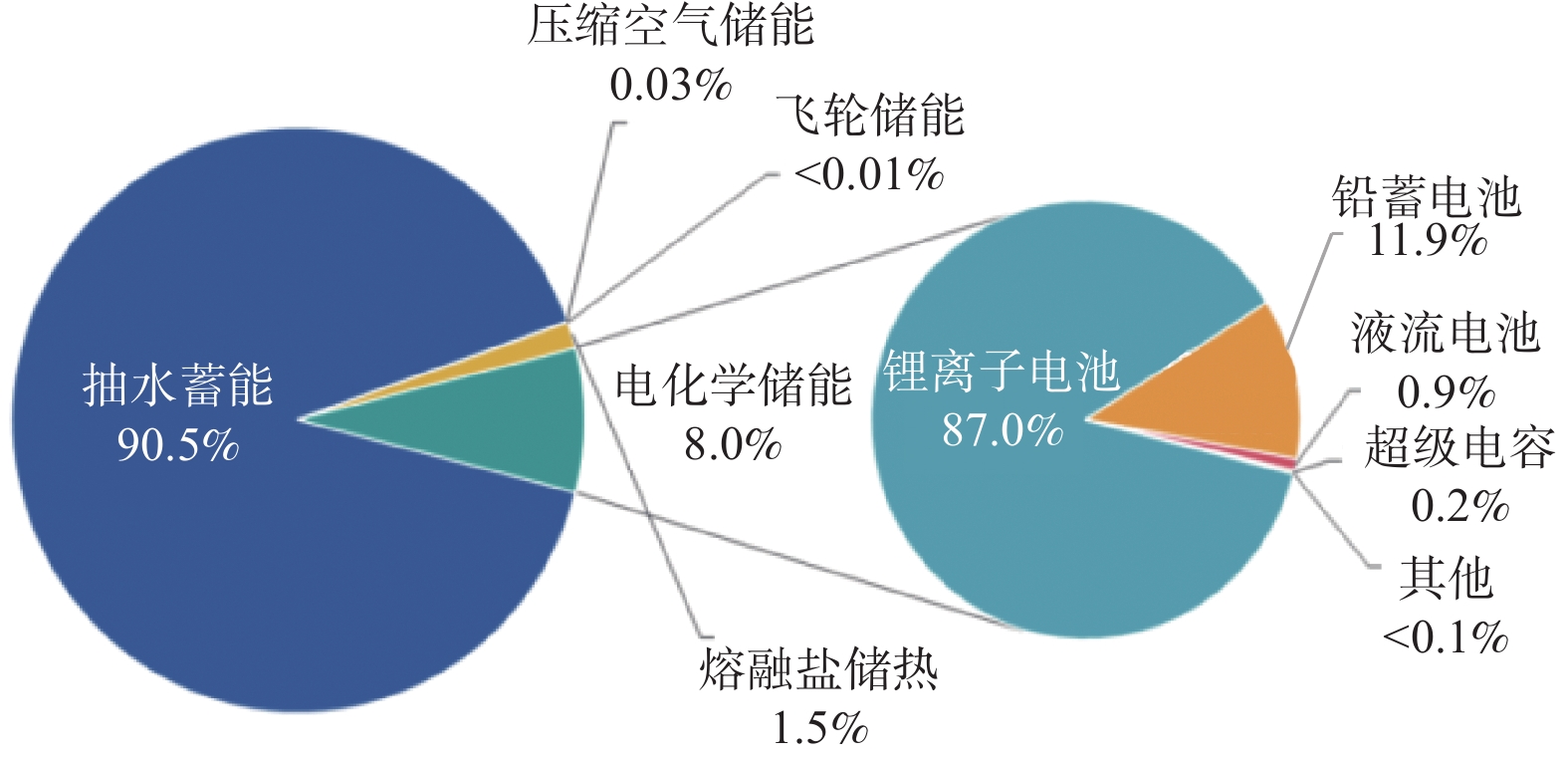
 下载:
下载:
